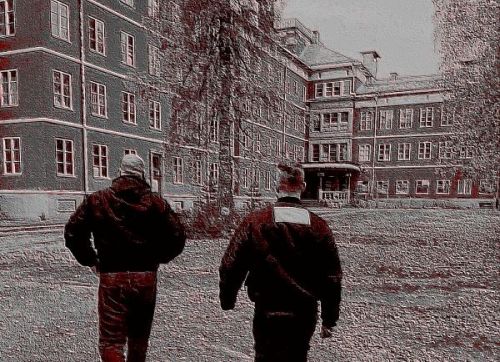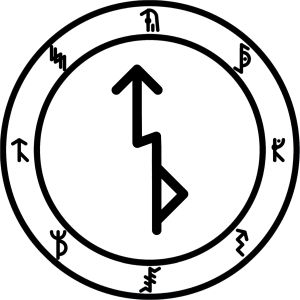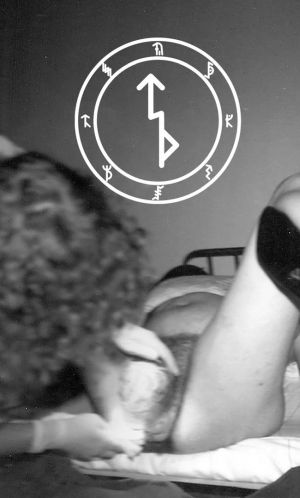
Some Scars Run Painfully Deep [2022-08-23]Sdug Bsngal are a Swedish two-piece that offer-up a jarringly and unnervingly mix of elegant piano playing, black metal, ambience, blunt PE/noise elements, and emotional-if-wonky moody music. The pair recently had their self-released debut album reissued by Stockholm-based Ominous Recordings as a C80 – and I think it’s fair to say it’s one of the most bizarre/unbalancing releases I’ve heard in some time – and we get all manner of strange, odd, noisy and wonderful fare through our doors. I track down the project’s two members simply known as R. & J. for an E-mail interview – discussing all that Sdug Bsngal is, their debut album, and the future of the project. M[m]: Please talk about how and when Sdug Bsngal came about, and what is the origin/meaning of the project’s name?
R.: Sdug Bsngal (Tibetan for “suffering”) is an entity with whom I communicate and am obsessed with, or rather possessed by, since forever. Pain and suffering haunted me since birth, but what I once believed was a curse turned out to be a true blessing. Nowadays I am eternally grateful for the painful tribulations and the creativity thereof.
J.: I approach the project as an aesthetic exploration of Christian redemptive suffering, of which I see a particular reflection in the experiences and philosophical process of R. Of course, I also keep a wary eye on him in case we need an actual exorcism, as per the last paragraph.

M[m]: You talk about Sdug Bsngal also as an entity you communicate with- does it have a certain/set form?
R.: For decades I was convinced that I was cursed since birth, because misfortune seemed to haunt me everywhere I went. I grew up in a so-called broken home, to say the least, and my childhood included several traumas such as sexual abuse, junkie parents, different foster families and much more. This bad luck haunted me in my twenties as well, as if some entity wanted me to finally commit suicide, but whenever I felt like giving up, I repeated “What doesn’t kill you, makes you stronger” and “Everything happens for a reason” as mantras. For surviving all of this I thought that the universe owed me a reward served on a silver platter, and for a very long time I waited for that to happen. It never did, though, so I started to work for what I wanted instead of wishing for it, and then I got the rewards that I wanted for so many years. I realized that this entity was more of a fylgja, or guardian angel, rather than an enemy of mine. Today I’m eternally grateful for every painful challenge this entity has put me through, because otherwise I wouldn’t who I am today. This formless entity, whoever it may be, works in mysterious ways. Nowadays I’m never tempted to end my life, because if I’ve come this far, I might as well see this whole thing through just to prove to myself that I can do it. Also, for as long as I can remember, I’ve had incurable creativity, and I suspect that the source for this is the very same as that of my blessed curse. This project’s had many a name throughout the years, such as Sjukdom (“disease”) as early as 1998, and the logo for that project is actually included in the booklet of Lifelover’s fourth and final full-length album with the very same name. Since 2010, however, I’ve called it Sdug Bsngal. This is the project I’ve always wanted: a sanctuary where creative freedom reigns. Every idea I’ve ever had – be it a song in which punk, noise and jazz may co-exist, or having a field recording from a haunted house in the background for the sake of atmosphere – has a chance to be realized, because there simply are no rules.
M[m]: The project’s one and only release to date is Πάθει μάθος – which you first released as a digital download in 2021, and recently got a re-issue as a C80 on Ominous Recordings. Please talk about how long it took to record/make the release – as it’s a very dense and strange affair?
R.: The decision for Ominous Recordings to release our debut full-length album was made in April 2021, but Johan had several releases planned before ours, which is why the cassette wasn’t released until February 2022. I’ve known him for nineteen years, I think, and Ominous was the only label I contacted when our work was ready to be published. While he mostly releases harsh noise wall, the concept of his label is a perfect fit for Sdug Bsngal: it’s underground; it’s not limited to any genres; it’s for the avant-garde, experimental and insane; and it pushes musical boundaries.
J.: The work is mainly anchored in R.’s personal narratives, but I was invited to cast light upon them from my own perspective. The process was rather slow and painstaking, not least since I (unfortunately yet fruitfully) went through a particularly difficult period in my own life which almost perfectly coincided with the recording of this release.
M[m]: Πάθει μάθος stands as one unbalancing, at points jarringly contrasting, release I’ve heard in some time – with its mix of audibly set-back black metal, elegant piano playing, ambience, crude PE/noisemaking, and felt, if at points off-kilter mood music. Was this deliberately meant that way, or did it just morph/change as you went on?
J.: I think all sorts of creative endeavours must to some extent combine these two aspects. There is deliberate intent, of course, but unless the artwork somehow attains a life of its own, it’s not really genuine. David Lynch likens the creative act to the mind’s catching fish in the sea of consciousness. I think that’s a good metaphor. We can intentionally plan to catch the fish, but it must actually come to us first. And when we’ve actually managed to catch it, we’re dealing with a wild animal with a will of its own, sometimes very much at odds with what we had in mind.
M[m]: Your sound utilizes elements of both BM and noise. Which genre did you get into first, and what do you see as key albums in each of these genres, and please explain why?
R.: I was introduced to black metal when I was thirteen years old and it has since had an important part of my life. With the exception of obvious albums such as Bathory’s self-titled debut full-length album and Blasphemy’s Fallen Angel of Doom, I, personally, consider every release by Funeral Mist (especially Maranatha), Marduk (2004-), Malign and Revenge to be essential.
J.: I’ve roots in metal as well as industrial music. Didn’t really get into black metal per se until I encountered bands such as Sortsind, Silencer and ColdWorld. I think Summoning is really brilliant as well, their early stuff being one-of-a-kind. In terms of industrial & noise (which I consider intimately intertwined), Coil, Psychic TV, Throbbing Gristle & Cabaret Voltaire are indispensable. Although I’m most partial to Skinny Puppy and their related projects, especially later work.

M[m]: Πάθει μάθος translates to “He learned a lesson” – so what is the meaning behind the album’s title?
R.: Πάθει μάθος is from Agamemnon by Aeschylus, and it means that there is knowledge to be found in suffering, which is our philosophy.
J.: Indeed. My take on this title is through the specifically Catholic perspective on redemptive suffering, according to which the believer can receive the gift of vicariously participating in Christ’s transcendent suffering by offering his or her own insignificant troubles to be nailed to the cross, to be used as humble tools by the Lord.
M[m]: You mention Catholicism relating to the album – what are your thoughts on organized religion in general? And do either of you have any formal faith?
J.: I’m a traditionalist Roman Catholic. Also an anarchist. I think the state is an abomination and that formal hierarchical structures is something very precarious. At the same time, I don’t believe that the Church is something man-made.
M[m]: Could you discuss some of Πάθει μάθος’s lyrical content?
R.: “Kάθαρσις I” is a recollection of one of at least three hundred times when I was sexually molested by my stepfather for six years. “Kάθαρσις II” is sort of a hate mail, you could say, to my biological mother who is a disgusting person.
M[m]: Πάθει μάθος mix is very layered – with often certain elements set way back in the mix. Did it take a while to get the mix just right?
J.: Yes, it was a process. We had good assistance from Emil Lundin, however.
M[m]: Added to the unbalancing feel of the sound you create the album’s cover featuring a crude/puzzling picture of a woman giving birth. Are you able to discuss what’s the meaning behind this?
R.: The album cover is a photograph from when my biological mother gave birth to me in 1985, which is suitable, because Sdug Bsngal is personal to me, even auto-biographical, in many a different way.
M[m]: As far as I can gather Sdug Bsngal is a two-piece – who does what, and did you have any guests on the album?
J.: There are no guests on this particular record. Oh, except my father’s performance of an inverted falsetto scream that I secretly recorded after dinner with my parents. No joke. Otherwise, it’s a mix. We’re both doing a bit of everything. Both perform vocals. Both of us discuss compositions and the layout of pieces. Both of us are involved in the lyrics &c.
M[m]: Do each of you have your own sonic roles within Sdug Bsngal? And are these set & firm?
J.: Well, we have tasks in which we collaborate as far as we’re able, not least by discussing the experiments and various musical suggestions that come up. Neither of us is uncompromising in relation to our artistic output, and both are willing to learn from and interact with the other, which I find somewhat unique. This, to me, means that the work is free to find its own form in relation to the both of us, rather than either of us forcing through preconceived notions.
M[m]: Could you discuss the runes/symbols used on the album’s artwork? And what are their meanings?
R.: The central bindrune of the seal represents what I consider to be the core concept of Sdug Bsngal: by enduring pain and suffering and daring to explore the darkness on the crooked path, one may be enlightened and strengthened and move ever forward and upward towards the absolute.
M[m]: Early on you quoted David Lynch – do you see his output as an influence on your work? And what were some of the film/literary influences on Πάθει μάθος?
R.: I am actually my own inspiration for Sdug Bsngal, considering how personal this project is to me, but since I do love both film and literature, I will mention but a few of my favourites: Le Divin Marquis de Sade, Nikanor Teratologen, Cormac McCarthy, Comte de Lautréamont’s The Songs of Maldoror (1868-1869), American Psycho (1991) by Bret Easton Ellis, Samuel R. Delany’s Hogg (1995), Chuck Palahniuk’s Fight Club (1996), George Orwell’s Nineteen Eighty-Four (1949), Salò, or the 120 Days of Sodom (1975), Begotten (1989), Men Behind the Sun (1988), From Beyond (1986), Gummo (1997), Kids (1995), Aftermath (1994), All Night Long (1992), Nekromantik (1987), Tetsuo: The Iron Man (1989), Visitor Q (2001), Black Swan (2010), Martyrs (2008), Alejandro Jodorowsky, Gaspar Noé, David Cronenberg and David Lynch are some that first come to mind.
J.: Nice list, R. Lynch is a pretentious bastard, but I love him. He has a special gift towards communicating the hidden nature of things, the dark and ominous workings beneath picturesque suburbia as well as the transcendent holiness that lies behind the humble humdrum kitchen sink reality of decaying every day. I think we both aspire towards getting across some of these truths as well.

M[m]: How did you both first meet, and what triggered you to work together?
J.: Good question. We met in… Well, the equivalent to Jr. high school, at the age of 13. Then we reconnected around 2013, and started discussing music. R. actually got me in touch with the rest of Malacht after I mentioned how I thought black metal paradoxically was much more apt at expressing and affirming certain key points of traditional Christian theology than most watered-down aesthetics connected with Western Protestantism. R. and I didn’t get into talking about collaborating until much later.
R.: I met J. and my wife – the mother of my two children – the same year (1998), and they’ve actually been friends since they were three years old. We’re from the town Boden in the most northern county in Sweden, but we moved to the south when we were about eighteen. Sofia and I moved back from Stockholm to our hometown in 2016, and J. moved back a year later, I believe.
M[m]: I believe you both have a background in more formal black metal – please could you discuss this, and do you still have connections with the scene/enjoy more straight BM?
R.: Nowadays I mostly listen to black metal when I train four days a week in accordance with The Conjugate Method as made popular by the legendary godfather of powerlifting: Louie Simmons (1947-never) of Westside Barbell.
J.: I’m part of RiM. In general, I think black metal is a difficult phenomenon to characterize, a quite opaque artform, so I’m a bit hesitant at describing it as akin to other “genres” in the framework of the consumer market. Its spirit is rebellion, so it’s very much antithetical to almost all of the nonsense forced upon us through mass culture. It’s also almost entirely marginalized today, with nearly nothing similar being created in the sphere of music, save for perhaps in connection to vaporwave and similar experiments, or maybe the underground rap scene. That being said, I appreciate any attempt to push the boundaries of the form, not least the work being done in Asia and the Middle East. I think art as such needs a thoroughgoing revival, and black metal would have much to contribute to such an endeavour.
M[m]: What’s next for Sdug Bsngal, and would you ever consider playing in a live setting with the project, or is that not practical with your sound?
J: I think live performances would be feasible. Something along the lines of the Cabaret Voltaire of the 1910s and the Ee ja nai ka-movement (ええじゃないか) of the Japanese 1860s comes to mind.
M[m]: Have you started work on Πάθει μάθος follow-up yet? And if so any hints on what it might sound like?
R.: We are currently working on our sophomore full-length album and have since the release of our debut, but the creative process is certainly not to be hasted or else the end result will suffer. Since Sdug Bsngal is a collaboration between the innermost beings of the two of us, the sound will naturally resemble that of Πάθει μάθος, but, considering how we have evolved since then, it will differ somewhat.
Thanks to both J. and R. for the interview, and Johan from Ominous Recordings for making it possible.
https://ominousrecordings.bandcamp.com/
https://ominousrecordings.bigcartel.com/
https://sdugbsngal.bandcamp.com/
https://facebook.com/sdugbsngal
https://instagram.com/sdugbsngal/
https://twitter.com/sdugbsngal
https://t.me/sdugbsngalofficial
sdugbsngalofficial@gmail.com
Roger Batty
| 
